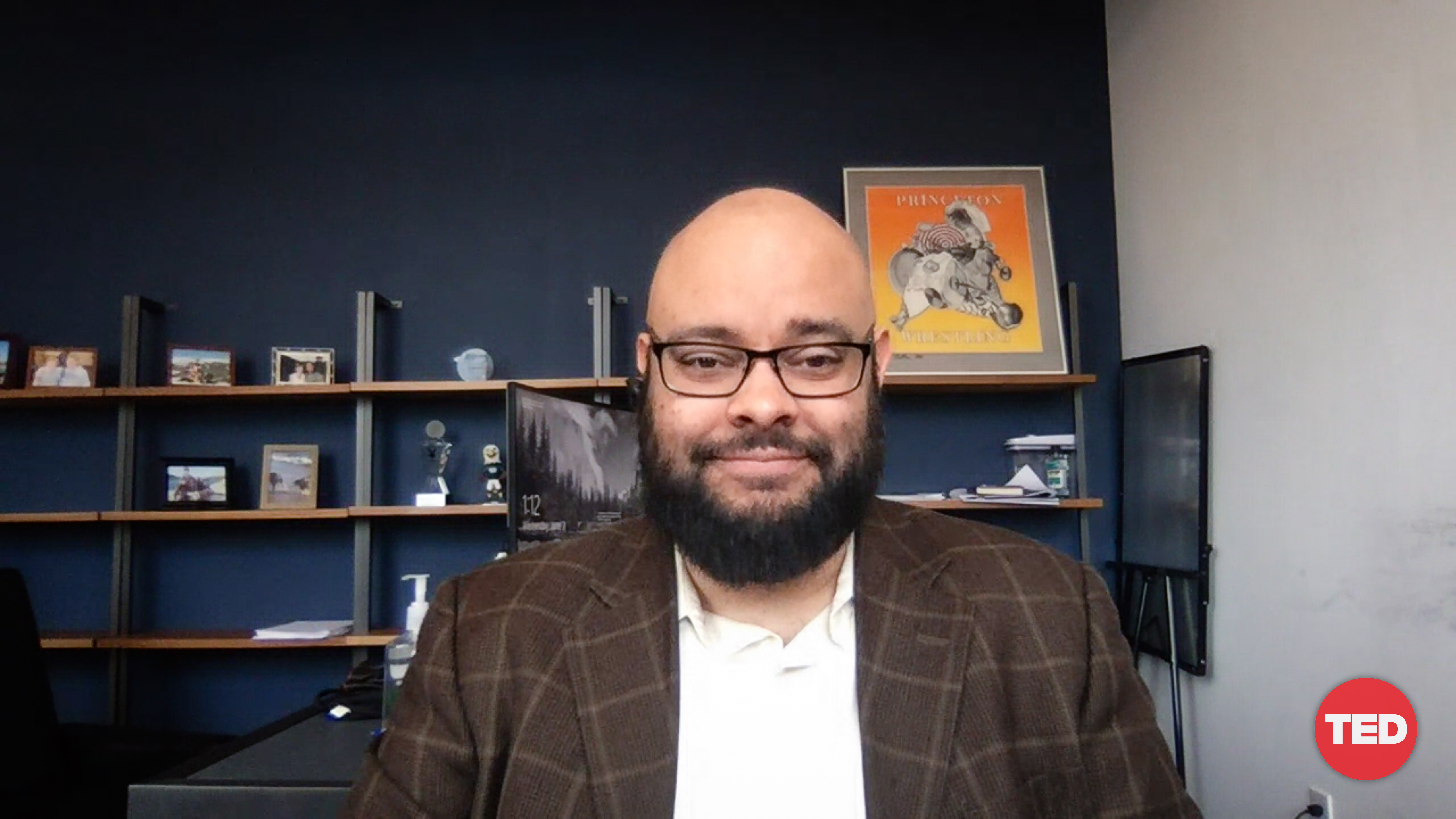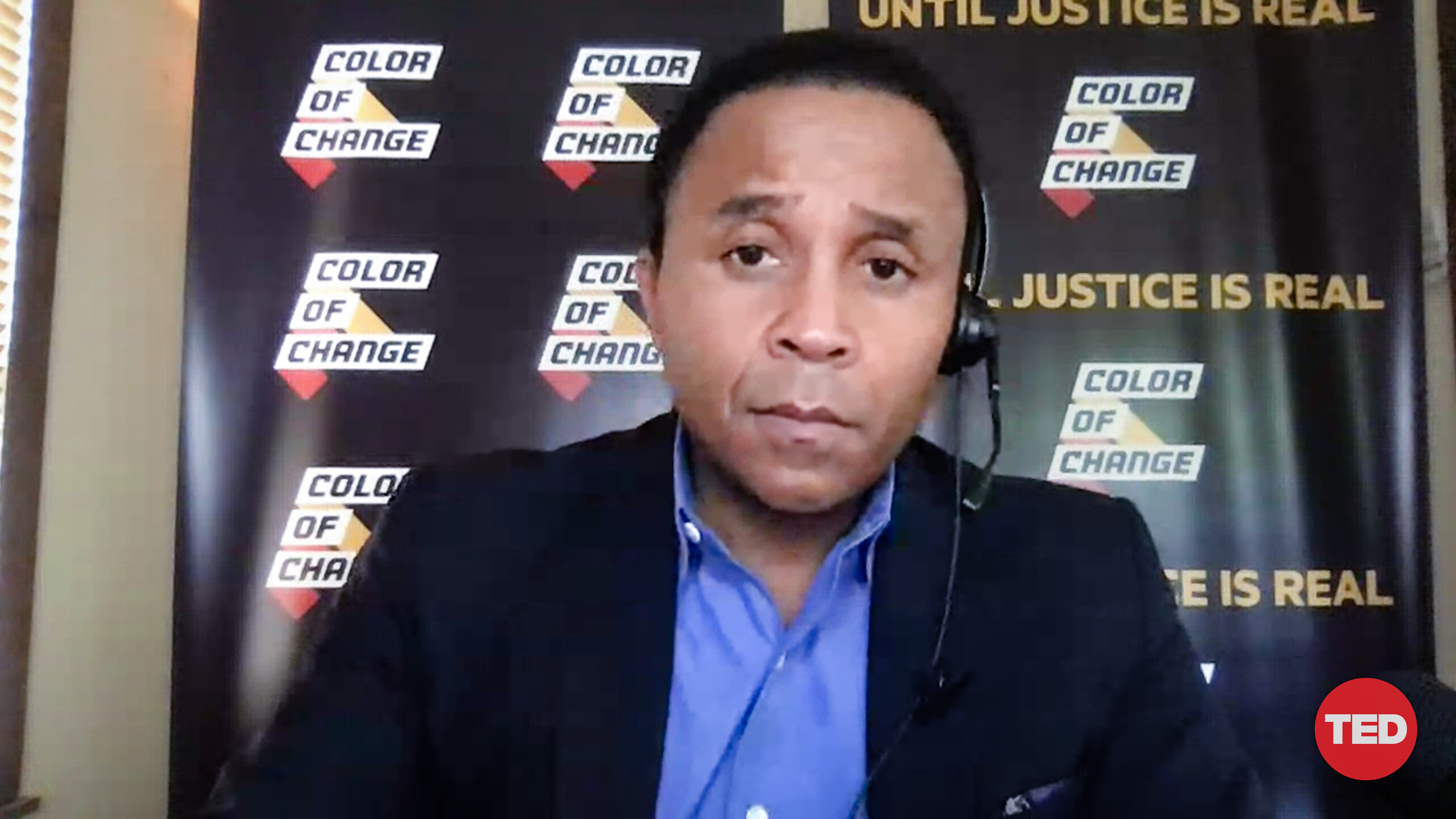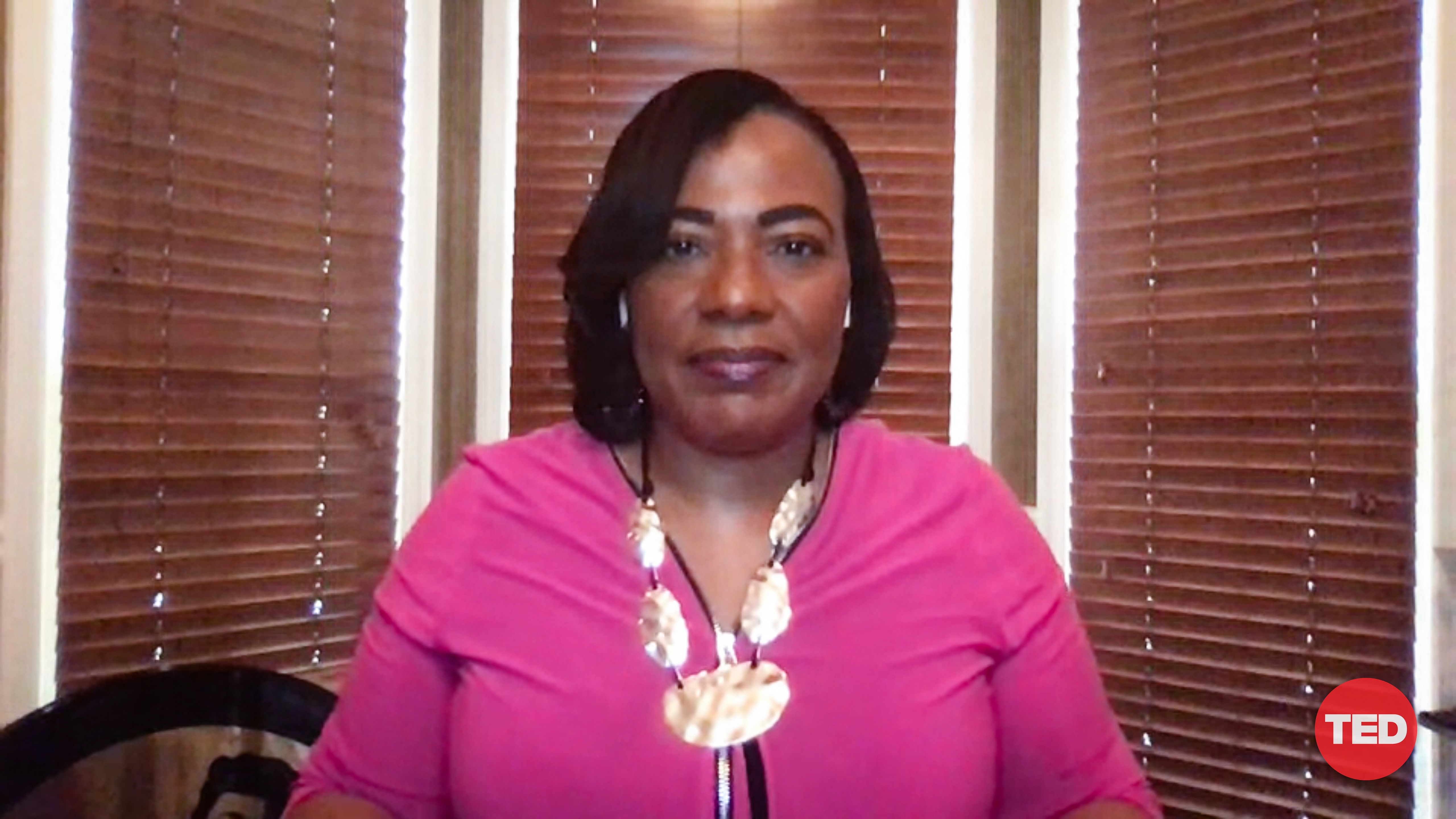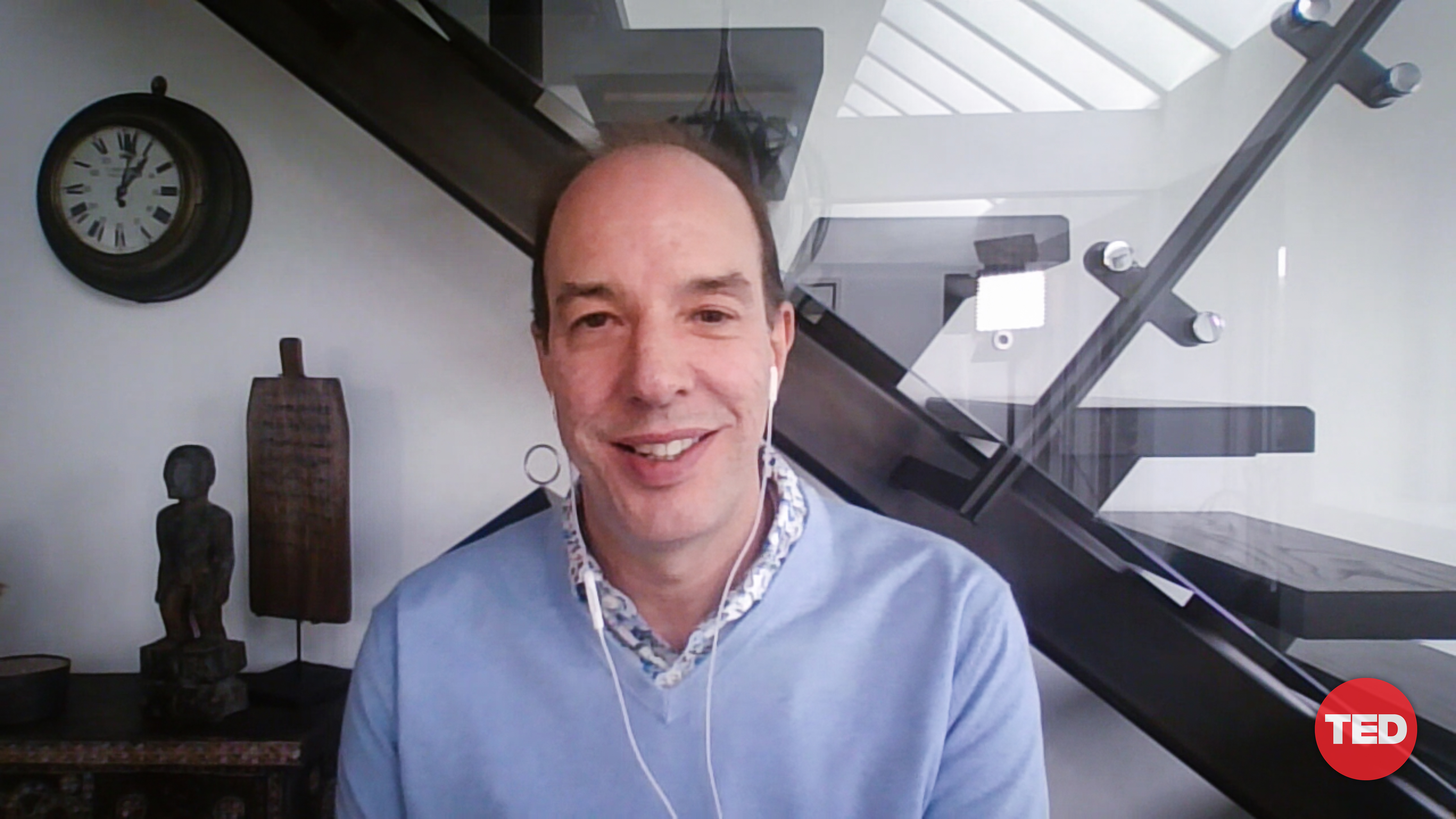In response to the historic moment of mourning and anger over the ongoing violence inflicted on Black communities by police in the United States, four leaders in the movement for civil rights — Dr. Phillip Atiba Goff, CEO of Center for Policing Equity; Rashad Robinson, president of Color Of Change; Dr. Bernice Albertine King, CEO of the King Center; and Anthony D. Romero, executive director of the American Civil Liberties Union — joined TED2020 to explore how we can dismantle the systems of oppression and racism. Watch the full discussion on TED.com, and read a recap below.

“The history that we have in this country is not just a history of vicious neglect and targeted abuse of Black communities. It’s also one where we lose our attention for it,” says Dr. Phillip Atiba Goff. He speaks at TED2020: Uncharted on June 3, 2020. (Photo courtesy of TED)
Dr. Phillip Atiba Goff, CEO of the Center for Policing Equity
Big idea: The bill has come due for the unpaid debts the United States owes to its Black residents. But we’re not going to get to where we need to go just by reforming police.
How? What we’re seeing now isn’t just the response to one gruesome, cruel, public execution — a lynching. And it’s not just the reaction to three of them: Ahmaud Arbery, Breonna Taylor and George Floyd. What we’re seeing is the bill come due for the unpaid debts that the US owes to its Black residents, says Dr. Phillip Atiba Goff, CEO of the Center for Policing Equity (CPE). In addition to the work that CPE is known for — working with police departments to use their own data to improve relationships with the communities they serve — Goff and his team are encouraging departments and cities to take money from police budgets and instead invest it directly in public resources for the community, so people don’t need the police for public safety in the first place. Learn more about how you can support the Center for Policing Equity »

“This is the time for white allies to stand up in new ways, to do the type of allyship that truly dismantles structures, not just provides charity,” says Rashad Robinson, president of Color of Change. He speaks at TED2020: Uncharted on June 3, 2020. (Photo courtesy of TED)
Rashad Robinson, president of Color Of Change
Big idea: In the wake of the murders of George Floyd, Breonna Taylor and Ahmaud Arbery, people are showing up day after day in support of the Movement for Black Lives and in protest of police brutality against Black communities. We need to channel that presence and energy into power and material change.
How? The presence and visibility of a movement can often lead us to believe that progress is inevitable. But building power and changing the system requires more than conversations and retweets. To create material change in the racist systems that enable and perpetuate violence against Black communities, we need to translate the energy of these global protests into specific demands and actions, says Robinson. We have to pass new laws and hold those in power — from our police chiefs to our city prosecutors to our representatives in Congress — accountable to them. If we want to disentangle these interlocking systems of violence and complicity, Robinson says, we need to get involved in local, tangible organizing and build the power necessary to change the rules. “You can’t sing our songs, use our hashtags and march in our marches if you are on the other end supporting the structures that put us in harm’s way, that literally kill us,” Robinson says. “This is the time for white allies to stand up in new ways, to do the type of allyship that truly dismantles structures, not just provides charity.”

“We can do this,” says Dr. Bernice Albertine King. “We can make the right choice to ultimately build the beloved community.” She speaks at TED2020: Uncharted on June 3, 2020. (Photo courtesy of TED)
Dr. Bernice Albertine King, CEO of The King Center
Big idea: To move towards a United States rooted in benevolent coexistence, equity and love, we must destroy and replace systems of oppression and violence towards Black communities. Nonviolence, accountability and love must pave the way.
How? The US needs a course correction that involves both hard work and “heart work” — and no one is exempt from it, says Dr. Bernice Albertine King. King continues to spread and build upon the wisdom of her father, Dr. Martin Luther King Jr., and she believes the US can work towards unity and collective healing. To do so, racism, systemic oppression, militarism and violence must end. She calls for a revolution of values, allies that listen and engage and a world where anger is given space to be rechanneled into creating social and economic change. In this moment, as people have reached a boiling point and are being asked to restructure the nature of freedom, King encourages us to follow her father’s words of nonviolent coexistence, and not continue on the path of violent coannihilation. “You as a person may want to exempt yourself, but every generation is called,” King says. “And so I encourage corporations in America to start doing anti-racism work within corporate America. I encourage every industry to start doing anti-racism work and pick up the banner of understanding nonviolent change personally and from a social change perspective. We can do this. We can make the right choice to ultimately build the beloved community.”

“Can we really become an equal people, equally bound by law?” asks Anthony D. Romero, executive director of the ACLU. He speaks at TED2020: Uncharted on June 3, 2020. (Photo courtesy of TED)
Anthony D. Romero, executive director of the American Civil Liberties Union (ACLU)
Big idea: No matter how frightened we are by the current turmoil, we must stay positive, listen to and engage with unheard or silenced voices, and help answer what’s become the central question of democracy in the United States: Can we really become an equal people, equally bound by law, when so many of us are beaten down by racist institutions and their enforcers?
How? This is no time for allies to disconnect — it’s time for them to take a long look in the mirror, ponder viewpoints they may not agree with or understand and engage in efforts to dismantle institutional white supremacy, Romero says. Reform is not enough anymore. Among many other changes, the most acute challenge the ACLU is now tackling is how to defund militarized police forces that more often look like more standing armies than civil servants — and bring them under civilian control. “For allies in this struggle, and those of us who don’t live this experience every day, it is time for us to lean in,” Romero says. “You can’t change the channel, you can’t tune out, you can’t say, ‘This is too hard.’ It is not that hard for us to listen and learn and heed.”